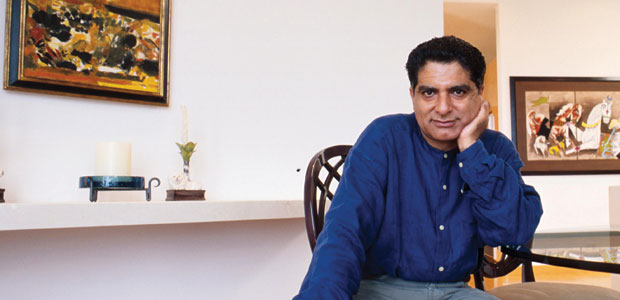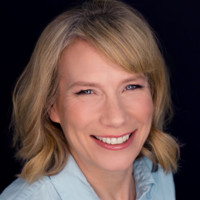Advertisement
Deepak Chopra
Deepak Chopra isn’t exactly known for being a man of few words. The New Delhi-born, California-based health guru is notorious for giving talks that last three to four hours and for peppering his speeches with personal anecdotes and self-deprecating jokes. The range of Chopra’s subject matter is vast; he quotes such luminaries as Rumi, Krishna, … Continued

Deepak Chopra isn’t exactly known for being a man of few words. The New Delhi-born, California-based health guru is notorious for giving talks that last three to four hours and for peppering his speeches with personal anecdotes and self-deprecating jokes.
The range of Chopra’s subject matter is vast; he quotes such luminaries as Rumi, Krishna, Mahatma Gandhi, and Albert Einstein, and covers everything from quantum healing and spirituality to personal relationships and success.
Yet despite his hours-long lectures and far-reaching knowledge, Chopra’s message is extraordinarily simple. In fact, his teachings all share a single mantra: Know yourself.
Expanding Consciousness
“For the last 30 years I have been talking about consciousness,” Chopra tells alive magazine on the line from the Phoenix, Arizona Ritz Carlton, in between interviews with CNN and Larry King. “It all boils down to one thing: our consciousness is the most important reality. Self-knowledge is the most important thing. Everything else is an illusion.”
Chopra is quick to explain that “consciousness” is just another word for “awareness,” “soul,” and “spirit.” “They all mean the same thing,” he says in his characteristic measured tone. “There are infinite possibilities if we expand our consciousness. It influences everything: cognition, thinking, relationships, personal behaviour, emotions, environment, biology, perception. All of this is an expression of consciousness. If you understand your consciousness, you will have health, personal evolution, and success.”
It certainly seems as though Chopra is speaking from experience. In 1999, Time magazine called him the “poet prophet of alternative medicine.” He’s written more than 40 books that have been translated into 35 languages, many of which have become best-sellers, and he has his own wellness program on Sirius Satellite Radio.
He heads the Chopra Center for Well-Being in Carlsbad, California, and maintains a busy blog (choprablog.com) that explores personal, social, environmental, and spiritual issues. To say that Chopra is in demand is an understatement.
Why, in an era when self-help books and self-proclaimed healers are as ubiquitous as Starbucks outlets, is Chopra so popular? “I think they like my Indian accent,” he deadpans.
Looking Inward
In all seriousness, Chopra explains that, despite modern medical advances, people continue to yearn for–and struggle with–the physical, emotional, and spiritual harmony he so fervently believes in.
“We’ve been taught that money and technology will make you happy, that weapons will make you secure,” he says. “In fact, some of the richest people in the world aren’t the happiest, and more weapons make you less secure. Look at America.
“People don’t go inward,” he continues. “We’re always looking to the outside for answers. Carl Jung said that looking outward is dreaming while looking inward is awakening.”
Chopra’s approach to well-being is rooted in Ayurveda, a millenniums-old holistic health-care system from India. One of its guiding principles is that health is a dynamic state of balance between the body, mind, and spirit. According to Ayurveda, we each have a unique combination of three doshas, or elements–vata, pitta, and kapha–that make up our constitution type.
Ayurveda maintains that the mind exerts a deep influence on the body, Chopra explains. People need to learn to see things through the eyes of the soul instead of the eyes of the mind or body, for the power of the soul leads to a higher state of consciousness. In fact, the soul’s resilience is what piqued Chopra’s interest in integrated medicine in the first place.
“Physicians are superb technicians,” says Chopra, who turned 60 in October. “They understand everything about the human body, but they are not great healers, because they know nothing about the human soul.”
Connecting Mind and Body
Chopra, a former endocrinologist, moved to the United States in 1970 and taught at Tufts University and Boston University medical schools and became chief of staff at the New England Memorial Hospital. He started exploring the mind-body connection in the early 1980s, when the notion was widely dismissed by the medical establishment.
In 1993 Chopra wrote Ageless Body, Timeless Mind: The Quantum Alternative to Growing Old, which caught the attention of Oprah Winfrey. An appearance on her TV show propelled him to celebrity.
Besides his prolific writing career, Chopra has shared the public stage with His Holiness the Dalai Lama, whom he calls a friend. Among the celebrities who have embraced his messages are Madonna, Demi Moore, and Sting.
Accepting Critics
Not everyone is a member of the Deepak Chopra fan club. Stephen Barrett, for instance, a retired psychiatrist who heads the Quackwatch website, calls Chopra’s teachings “Ayurvedic mumbo-jumbo.” Robert Todd Carroll, the author of The Skeptic’s Dictionary (Wiley, 2003), states this on his website: “What Chopra is peddling is quantum gibberish.”
“Over the years, I’ve become immune to criticism,” Chopra says. “Besides, there are less and less of them [critics]. They have their own mumbo-jumbo too. I specialize in a particular discipline, and there are other people who are not well versed in that discipline. But as you get older, you realize that criticism is part of life. If you don’t have critics, you’re probably not saying anything important.”
Chopra has also been attacked for the apparent contradiction between his spiritual leanings and how much money he makes. Tickets to a talk in Calgary last fall, for instance, started at $75.
The Chopra Center for Well-Being, which he opened with Dr. David Simon in 1996, at La Costa Resort and Spa, costs anywhere from hundreds to thousands of US dollars to attend. The shop on his website sells everything from $5 incense holders to $35 jars of antioxidant-herbal jam and $190 chakra necklaces. Chopra, however, insists he’s not in his profession for the money.
For one, he notes that ticket prices for his lectures are set by promoters, not him. “I have never sought to accumulate personal wealth. I’m like a bank teller: It comes in and it goes out,” Chopra says with a laugh. “I have never sought to hold onto anything. To do so is to not have enough security in our own creativity.”
Pursuing Passions
Chopra’s current creative passion, aside from his family (which consists of his wife Rita, two kids, and two grandkids), is the Alliance for a New Humanity anhglobal.org). He describes the organization as “a critical mass of consciousness.” Its mandate is to creatively resolve conflicts and address injustices, ecological imbalances, and economic disparities.
The ANH is based on three Indian traditions that are required for change: satsang (to connect with people); simran (to communicate and to inspire others); and seva (to serve selflessly for the greater good).
The people involved in the alliance, Chopra says, want to be instruments for positive shifts in the world. Such noble goals all come back to Chopra’s assertion that the most important changes start within.
“Knowing who we are,” he says, “equals transformation and can lead to complete freedom.”
Deepak Chopra’s prolific writing career has produced more than 40 books, translated into 35 languages. Some of his titles include:
- The Seven Spiritual Laws of Success: A Practical Guide to the Fulfillment
of Your Dreams (Harmony, 1993) - Creating Affluence: Wealth Consciousness in the Field of All Possibilities (Amber-Allen Publishing, 1993)
- Golf for Enlightenment: The Seven Lessons for the Game of Life (Amber-Allen Publishing, 1995)
- Life After Death: The Burden of Proof (Harmony, 2006)
Principles to Live By
Deepak Chopra lives by these six principles that govern generating wealth and putting it to good use.
- Declutter.
- Don’t buy anything until you let go of something else. I never buy a new suit until I give away an old suit to someone.
- Nourish your body instead of filling it.
- If you spend money, do it in a way that helps the environment.
- Make sure you give enough gifts–tangible and intangible–to your family and friends.
- Do something that isn’t profit motivated.
Not Afraid of Dying
Deepak Chopra has long maintained that having a balanced lifestyle slows the aging process. However, he’s by no means afraid of dying–and his latest book aims to help other people feel the same way.
In Life After Death: The Burden of Proof, Chopra draws on scientific discoveries as well as Vedic scriptures and stories he heard while growing up in India to explore the afterlife. Death is nothing to fear, he argues, since we don’t actually die. Instead, the soul crosses over into a new phase of a continuous journey it’s on right now.
“If you know who you are, death is easy to accept,” Chopra says in an interview with alive. “Our spirit outlives our molecules. There are practical ways of getting in touch with our timeless self, and then you don’t have anxiety about death.
“Everything in this world is impermanent, and that’s why it’s so precious,” he adds. “You have to relinquish your attachment to what’s not going to be there forever. All unhappiness arrives from attaching yourself to the impermanent. If you recognize that everything is impermanent, then you approach everything with full love and caring.”





